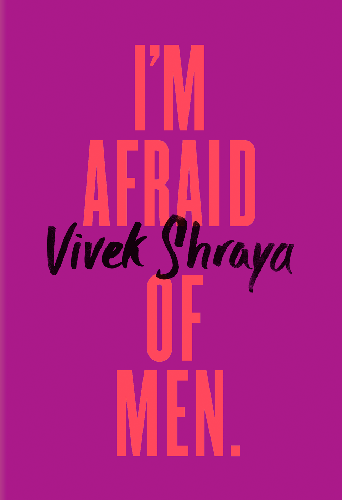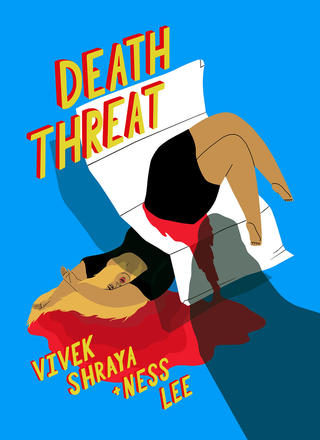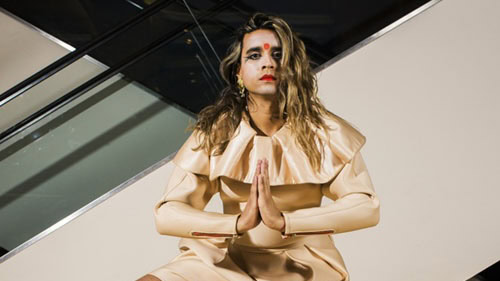By: Lo Humeniuk

Vivek Shraya’s work spans multiple mediums including music, film work, visual art, and fiction, but my first exposure to her voice was in her powerful book I’m Afraid of Men.
“I’m afraid of men because it was men who taught me fear.” Shrava’s powerful opening sentence lays the groundwork for an honest, thoughtful exploration on the complexities of how masculinity and femininity are framed, how damaging these binary boxes are, and how important it is to navigate through and beyond them. Shraya shares her path from growing up feminine, to rejecting her femininity and training as a man (“This assimilation into manhood is my true transition,” she writes), to cautiously reacknowledging her womanness, but with the frustrating caveat of not being “too” feminine. She writes about what led to each new stage in her life, the hyperawareness she possesses regarding gender representation and what is or is not considered threatening, and what can or cannot be expressed (and when) while still protecting herself. She discusses with frankness the means through which she puts on, and takes off parts of her identity for self-preservation. The choice of writing autobiographically is very deliberate. Her experiential learning, and her life path, have made her an expert in gender and gender performance. As a thesis statement of sorts, Shraya writes: “These experiences place me, a queer trans girl, in a unique position to address what actually makes a good man, and how we can reimagine forms of masculinity that don’t arouse fear.”
Throughout the book, Shraya touches on an assortment of topics: power dynamics between binary genders in day to day life; the intertwining or intersectionality of race and gender (“My brownness turns out to be a form of queerness in and of itself,” she notes); queerness and boundaries; how desire develops; and, what our idea of a “good man” is. In a beautiful chapter titled “you,” Shraya recounts a particular relationship she had, which blossomed slowly and ebbed and swelled over a long period of time. She follows this by breaking down why the notion of “a good man,” and what the bar is to be one, is so problematic. In part this has to do with the notion of the word “good” and how very unclear it is as a descriptor. What do we consider “good,” why is it considered “good,” and, how useful is it? What is the measure of “good” masculinity, and what traits does that include? And again: why? The way that Shraya lays out her points—through her personal experience—makes her message very clear to the reader, and draws the reader in through the detail and analysis of each event, and the description of the emotions and effects that followed. Shraya identifies a potential issue with this approach through her challenging question: “Why is my humanity only seen when I share the ways in which I have been victimized and violated?” And while this is an important issue to raise—and one that should be addressed in terms of how we interact with narratives and with people in general—her point, or call to arms, is heard. We must confront, examine, and challenge our concepts and ideas of gender. Shraya’s points call to mind Kate Bornstein, author of Gender Outlaw: On Men, Women, and the Rest of Us. Bornstein looks at gender identity and examines the problem of “living in a world that insists we be one or the other.” At the end of I’m Afraid of Men, Shrava muses “I wonder what my life might have been like if my so-called feminine tendencies […] had not been gendered or designated as either feminine or masculine at all. […] What if you were to challenge yourself every time you feel afraid of me—and all of us who are pushing against gendered expectations and restrictions? What if you cherished us as archetypes of realized potential?” This is the challenge she sets forth to us in I’m Afraid of Men, and an in-depth exploration of this challenge is very much a part of Shraya’s Scotiabank 2019 Contact Festival photography exhibition Trauma Clown, which runs until June 2nd.


I’m Afraid of Men is a book I’ve read multiple times and will read many more. We hold a copy at The ArQuives, as well as other work by Shraya including Even This Page is White, She of the Mountains, and God Loves Hair. We also carry the aforementioned book by Kate Bornstein, as well as countless texts which examine masculinity, femininity, and gender, among them: Boys Like Her: Transfictions; Men and Masculinity; The Making of Anti-sexist Men;, Gender Shock: Exploding the Myths of Male and Female; and Persistence: All Ways Butch and Femme. Though not yet in The ArQuives, Arsenal Pulp Press has just released Shraya’s new book Death Threat, a comic book informed by hate mail Shraya received in 2017 and illustrated by Ness Lee. We looks forward to adding this title to our library.


